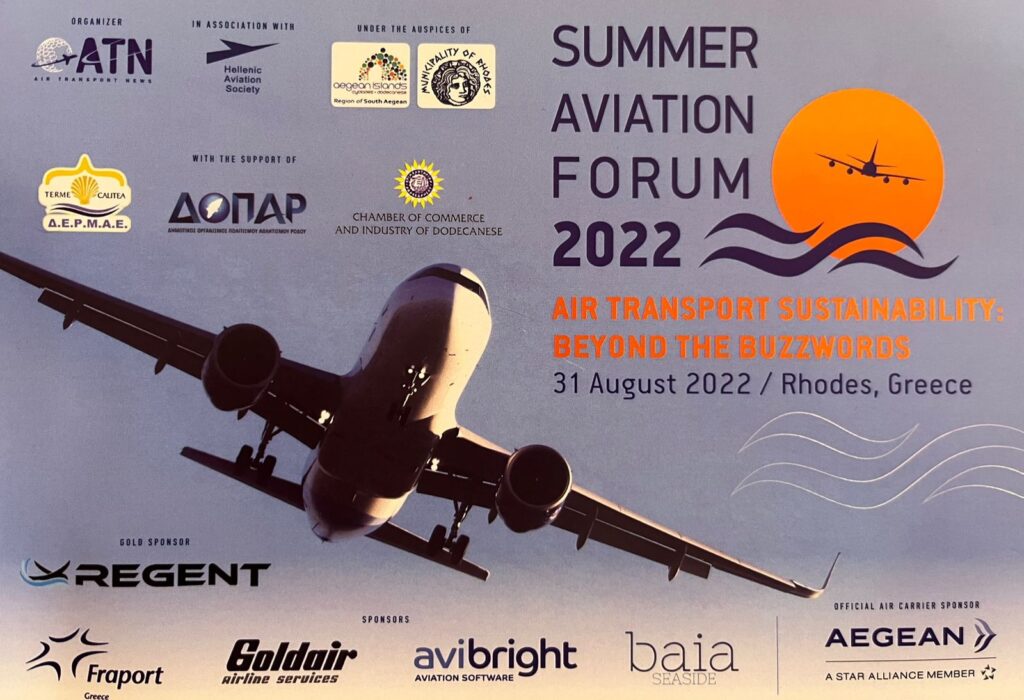The Governments’ Strategic Role in Delivering Aviation Sustainability
Created on 08.09.2022 12:08
Leaders of the aviation industry, academia, and government representatives gathered in Rhodes, Greece, for the ATN and Hellenic Aviation Society's 2022 Summer Aviation Forum to discuss the challenges raised by the implementation of aviation environmental targets in the midst of the Covid-19 pandemic.
The meeting, which was opened by Luis Felipe de Oliveira, Director General of ACI World, and Mehmet Nane, Chairman of IATA's Board of Governors, addressed the industry's existing environmental targets, the role of governments in regulating it, and the impact of new technologies on the future of aviation.The role of aviation as a driver of economic development, particularly tourism, was highlighted during the Leaders Session moderated by Dr. Michael Kerkloh, Lufthansa Board Member, as well as the negative impact of acting outside of the ICAO CORSIA mechanism.
Mr. Catalin Radu, Director General of AAK, represented Kazakhstan at the Forum. He emphasised the importance of governments in establishing the national regulatory framework for implementing the ICAO Sustainability Agenda and updated the Forum on the latest developments in Kazakhstan and the country's leadership role in the Central Asian Region. As an authorised civil aviation organisation, the Aviation Administration of Kazakhstan JSC announced its voluntary participation in the pilot and first phase of CORSIA in 2019. A special department on Sustainability was reformed in AAK in August 2022 to address the industry's challenges and support Kazakhstan's progress.
The amount of CO2 emissions from Kazakhairlines in 2019 was 832,026 tonnes, 315,805 tonnes in 2020, and 346,006 tonnes in 2021. At the moment, work is being done to introduce such amendments to the law. The relevant Regulatory Impact Analysis has been agreed upon with the Ministry of Ecology and forwarded to the CAC for further consideration.
The partial use of sustainable aviation fuels is one tool for reducing carbon emissions from aviation.Research, development and implementation of cleaner aviation fuels (SAF), lower carbon aviation fuels (LCAF) and other cleaner energy sources should be encouraged through policy and political instruments.Kazakhstan
has the potential to be a major producer of SAF/LCAF in the region, as well as a leader in aviation decarbonization.
Negotiations are currently underway with the Ministry of Ecology, Geology, and Natural Resources, "Zhasyl Damu" JSC, Kazakhstan's National Accreditation Center, and KazStandard for assistance in conducting the necessary studies and harmonisation of standards, legislation, and other bylaws relating to the control of emissions from the aviation sector.The Forum welcomed the progress made by Kazakhstan and encouraged the AAK to maintain its leadership role in promoting and implementing the ICAO Aviation Sustainability Agenda in the Region.Multiple discussions with relevant stakeholders will take place in the coming days to ensure mutual support for Kazakhstan positions at the upcoming ICAO Assembly.

3400 views
 Our company
Our company
 News
News
 Activities
Activities
 Online Flight plan
Online Flight plan
 AIS
AIS